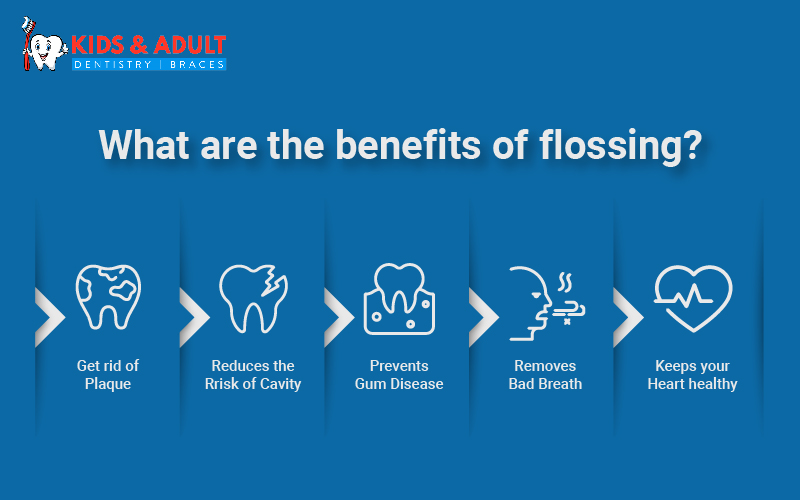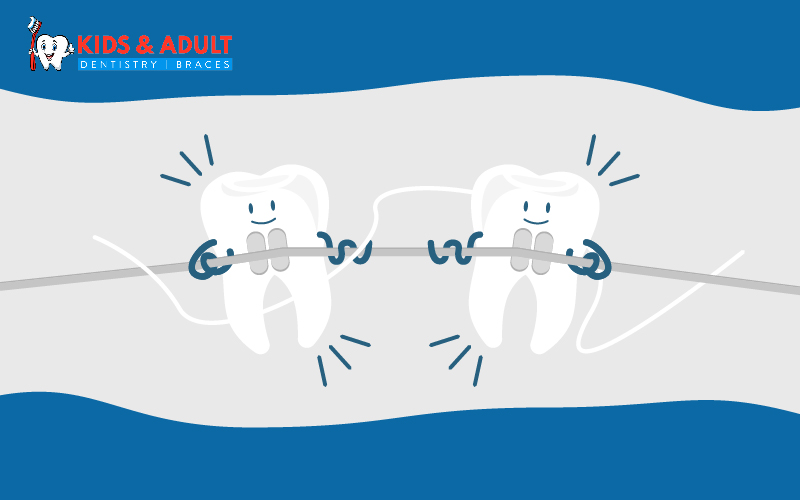Daily Flossing your teeth is an important component of your dental hygiene. On days that you skip flossing your sets, yellowish plague settles down between our teeth and on our gums.
With time, it can worsen the condition and cause tooth decay and disease. Floss is helpful to clean hidden areas where the toothbrushes cannot reach.
How Often Should You Floss, and When?
The ADA (American Dental Association) recommends people brush their teeth for two minutes twice a day and floss at least once. It is not compulsory to do it in the morning or at night; the person can floss their teeth anytime they desire.
Some people like to floss right when they wake up in the morning, while others prefer one last cleaning before bed.
Dentists recommended you floss your teeth before brushing them. As you floss, you naturally loosen food particles and remove the plaque around your teeth. The brushing can further help get rid of the plaque and particles.
What are the Benefits of Flossing?

1. Get Rid of the Layer of Plaque
Plaque is a yellowish sticky film that gathers around and settles down between your teeth and along your gums. Although it’s not visible with the first visit, plaque isn’t something you want to stay in your mouth for a longer time.
Plaque develops on and around your teeth, especially when bacteria in your mouth mix with any starchy or sugary food. These bacteria are responsible for releasing acids that further degrade carbohydrates.
Suppose you skip brushing and flossing of teeth then in such a case, the bacteria, carbohydrates, and acid will form a thick film of plaque all over the clean set of teeth.
The microorganisms in plaque release acids that attack your tooth enamel. If these harmful acids don’t wash out of your mouth with consistent and regular brushing and flossing, it can lead to cavities.
Furthermore, plaque buildup can harden and turn into tartar, which settles down near your gums. As this layer forms, your chances of developing gum diseases likely increase.
With regular flossing, you can remove food particles from and around your teeth and your gums.
Also Read: 3 Simple Dentistry Tips For Healthy Smiles
2. Reduces the Risk of Cavity
Cavities are the most common reason behind the damaged tooth. Although the process of cavity formation takes time, the more plaque you have seated thick on the enamel of your teeth, the quicker the cavities will develop, causing serious risks to your dental set.
Flossing your teeth and gums at least once a day can help a lot to eliminate tiny food particles and plaque buildup in your dental set and lower your risk of tooth decay.
3. Helps Prevent Gum Disease
Gingivitis is the first stage of most gum diseases. One of the visible symptoms of gingivitis is inflammatory gums and bleeding gums at the time of brushing or flossing.
If gingivitis is not considered, it can lead to a more severe stage known as periodontitis. In this stage, your gums separate from your teeth or pull away from your teeth.
Your teeth may start to lack muscle support and become loose. If not appropriately treated, periodontitis can lead to an inflammatory response and pain throughout your body.
Brushing your teeth twice and flossing can help minimize your potential risks of gum disease.
4. Removes Terrible Breath
Halitosis, in simple terms, bad breath is a serious problem. But can be easily worn off by flossing. When food gets stuck between your teeth, it starts to decay due to bacterial action.
If you don’t remove these food particles timely, it can lead you to have foul-smelling words.
5. May Help your Heart Health
An excellent and healthy dental hygiene is not only beneficial for your teeth and gums but also helps your heart health.
The American Heart Association, stated, ” healthy heart may have more to do with a connection between your oral health, your mind, your heart and your body.”
Why Flossing with Teeth Braces is Necessary?

When you have teeth braces on, a large portion of your enamel stays covered by brackets. On some occasions, when your food gets trapped around your brackets, wires, or between your teeth, it quickly attracts bacteria.
These bacteria are hazardous as they lead to cavities and various other gum diseases. Rampant tooth decay can turn out to be so bad that you might need to get a root canal treatment to preserve the rest of your healthy tooth and more severe cases can lead to the tooth extraction process.
Wearing braces or permanent retainers already provides plaque with many hidden spaces to grow and build; this leaves your teeth vulnerable to a lot of oral diseases.
While brushing your teeth can keep the bacteria away, it is not feasible to get between the teeth to remove the bacteria.
When people do not maintain proper oral hygiene by brushing and flossing correctly they tend to avoid visiting the dentist and orthodontists in general. Neglecting your dental hygiene can lead to serious dental problems.
Read Also: Flossing With Braces a Complete Guide for a Healthy Smile
What Kind of Floss Should I Use?
The most common dental floss usually comes in two varieties:
1. Waxed
2. Unwaxed
Selecting the right floss for you should depend upon your personal preference… ADA has also claimed that there’s no difference between the effectiveness of the two types. If your teeth are held tight together, wax-coated floss may make getting into those tiny spaces easier.
Nowadays, floss is also available as tape. It is broader and flat and reaches every small gap present in your teeth. If you have braces, bridges, or cracks, you should go for a super floss.
If you find regular floss hard to use, there are some alternatives you can try, such as water flossers, air flossers or interdental brushes.
Flossing your teeth daily only takes a few minutes of your time, but those few minutes can contribute to a lifetime of a healthy dental set. Dental floss is among the best tool in the market to keep your gums clean and healthy.
Keep flossing regularly- your gums will Thank you!

